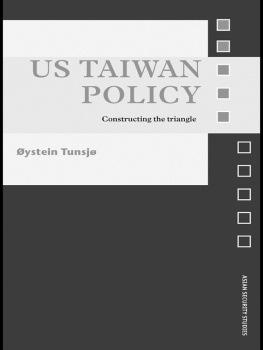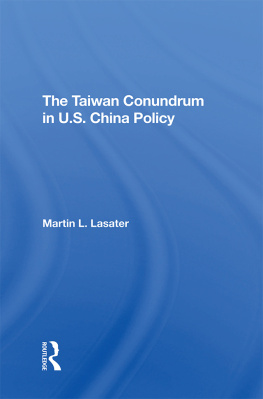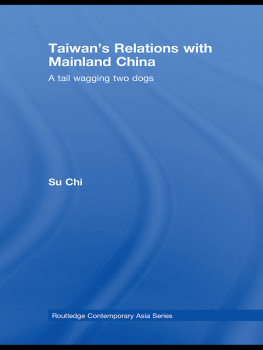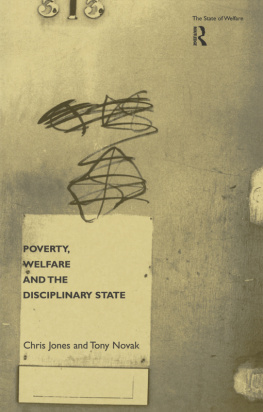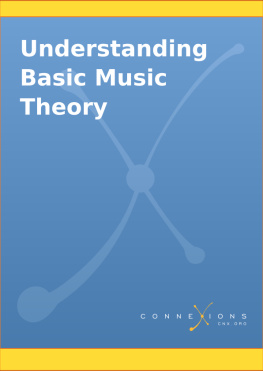Comparing the Social Policy Experience of Britain and Taiwan
First published 2001 by Ashgate Publishing
Reissued 2018 by Routledge
2 Park Square, Milton Park, Abingdon, Oxon OX14 4RN
711 Third Avenue, New York, NY 10017, USA
Routledge is an imprint of the Taylor & Francis Group, an informa business
Copyright Catherine Jones Finer 2001
All rights reserved. No part of this book may be reprinted or reproduced or utilised in any form or by any electronic, mechanical, or other means, now known or hereafter invented, including photocopying and recording, or in any information storage or retrieval system, without permission in writing from the publishers.
Notice:
Product or corporate names may be trademarks or registered trademarks, and are used only for identification and explanation without intent to infringe.
Publishers Note
The publisher has gone to great lengths to ensure the quality of this reprint but points out that some imperfections in the original copies may be apparent.
Disclaimer
The publisher has made every effort to trace copyright holders and welcomes correspondence from those they have been unable to contact.
A Library of Congress record exists under LC control number: 00109867
ISBN 13: 978-1-138-63694-1 (hbk)
ISBN 13: 978-1-315-20542-7 (ebk)
Pete Alcock is Professor of Social Policy and Head of the Department of Social Policy and Social Work at the University of Birmingham.
Ann Davis is Professor and Head of Social Work Studies at the University of Birmingham.
John Doling is Professor of Housing Studies at the University of Birmingham.
Hsiu-Hui Chen is Senior Specialist at the Department of Social Affairs, Ministry of the Interior, Taiwan.
Hsiao-Hung Nancy Chen is Professor and Dean of the Department of Sociology and College of Social Sciences, National Chengchi University, Taipei, Taiwan.
Catherine Jones Finer is Reader in Comparative Social Policy at the University of Birmingham.
Susan Hanley is Assistant Chief Probation Officer, West Midlands Probation Service, UK.
Yuan-shie Hwang is Associate Professor in the Department of Social Policy and Social Work, National Chi Nan University, Taiwan.
Yeun-wen Ku is Associate Professor in the Department of Social Policy and Social Work, National Chi Nan University, Taiwan.
Nick Le Mesurier is Research Associate at the Medical School, University of Birmingham.
Tony Maltby is Lecturer in Social Policy in the Department of Social Policy and Social Work, University of Birmingham.
Robert N. Matthews is a research student at the University of Birmingham.
Kate Morris is Lecturer in Social Work at the University of Birmingham.
Mike Nellis is Lecturer in the Department of Social Policy and Social Work, University of Birmingham.
Peter W. Preston is Professor of Politics at Birmingham University.
George Cheng Wang is Doctor and Professor at the National Chung-Cheng University, Taiwan.
Lih-Rong Wang is Associate Professor in the Department of Sociology, National Taiwan University.
Betty Y. Weng is Associate Professor in the Department of Youth and Child Welfare, Providence University, Taiwan.
So many people have contributed to this enterprise, it stands as a demonstration in itself of the virtues - and demands - of team effort.
Particular thanks are due to the individual contributors, for their willingness to deliver after the original conference (see below and ) and thence revise, mostly under pressure. In this context, indeed, more than particular thanks are due to contributors from Taiwan, who contrived to keep in touch and respond to editorial queries, notwithstanding the trying, testing circumstances in which they found themselves, in the wake of the earthquake of September 1999. (Its epicentre was so close to the new National Chi Nan University as to require the evacuation of its students and staff to Taipei (some 150 kilometres to the north) for teaching purposes, in between weekends spent on reconstruction work back at the university.) The determination of those so affected to deliver regardless, is as much testimony to their academic commitment, as it is a humbling example to others.
We are grateful to the University of Birmingham - the Department of Social Policy and Social Work, and the School of Social Sciences - for helping to fund and organise the initial Birmingham - Taiwan Social Policy Conference, whose success inspired the preparation of this volume. In particular, Mary Knoxs enterprise, patience and managerial skills in this connection proved invaluable and were much appreciated by this editor-to-be.
Finally we come to the book preparation team per se which, on this as on previous occasions, has effectively meant Sue Gilbert - otherwise a key secretary in the Department of Social Policy and Social Work - wearing another hat. In the world of camera-ready copy it is impossible to overstate the importance and relief of being able to draw on such knowledge, experience and efficiency. Heartfelt thanks to Sue for helping to ensure this book actually went to market.
CATHERINE JONES FINER
Beginnings
The immediate starting point for this book was the occasion of a Taiwan-Birmingham Social Policy and Social Work Conference, held at Birmingham University in April 1999. The novelty and success of this event generated the enthusiasm and commitment necessary for organising a publication to do justice to the papers presented and, it is hoped, to set a precedent for more such publications in the future. As far as possible, the papers have been grouped according to broad topic areas, but there has been no editorial interference with individual contributors styles of approach or of course with their policy perspectives. Each has been free to identify a topic and thence to formulate the questions they wish to see asked and answered. As such, therefore, this collection constitutes an original contribution, in both methodological and substantive terms, to the study of comparative social policy.
Comparative social policy per se has been slow to develop as a truly international subject. Some of the reasons for this have been glaringly practical - difficulties of language, differences over definitions of terms and concepts, variability as to the sorts of data likely to be available, being foremost amongst them. More fundamental, however, have been problems intrinsic to the very idea of comparing social policies on other than a normative basis. How well are we doing, by comparison with those with whom we would wish to be compared, according to the standards we have set for ourselves has certainly been the stance characteristic of social policy academics in the welfare state heartlands of Europe. To suggest that comparative social policy should be based on something other or additional to this, is in effect to strike at the very notion of social policy as embodying not merely a moral stance but - in principle, in the eyes of many champions - a moral stance of universal applicability. Relativism for comparative purposes - whether in relation to specific social policy objectives or to notions of the good society per se - can in this context seem like a denial of values and an abnegation of concern.
Yet, without some measure of relativism, it is difficult to see much of a future for comparative social policy at this time, when the need for cross-national exchange - not merely with regard to the conduct of business and labour markets, but to the social support systems underpinning these - is being ever more widely appreciated. So far, the main line of response to this problem - as epitomised by Doyal and Goughs



